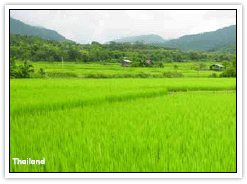2005 Progress Report
Agriculture, Irrigation and Forestry Programme
The Agriculture, Irrigation and Forestry Programme (AIFP) focuses on improving water use efficiency in agriculture and promoting healthy management of the basin for agriculture and forestry. The programme works directly to preserve the integrity of the four countries' watersheds through monitoring land-use practices, identifying challenges and development options and providing capacity building activities.

AIFP's strategy consists of a collaborative learning approach designed to meet the evolving needs of basin communities. The programme engages in the study of the best methods for monitoring land-use practices, which has included the acquisition and analysis of GIS and satellite images of the basin through cooperation with the Canadian Space Agency, and the completion of important baseline studies on watershed management, forestry and land use planning.
The programme provides MRC with a community-based mechanism for basin development, while facilitating the growth of basinwide policy and capacity building.
At the end of 2005 it was decided to incorporate the Challenge Programme on Water for Food under the AIFP umbrella.
The programme has two active components:
- The Watershed Management Project
- The Water Use Efficiency Component
The Watershed Management Project
The first phase of the Watershed Management project funded by German Technical Cooperation Association GTZ was successfully completed in November 2005. A progress review showed positive results for WSMP, and it has secured funding to progress to a second phase. Capacity building is an important part of the project's work and in 2005 it focused on improving knowledge levels among those involved in watershed work in the region.
Key achievements in 2005 included:
- Organising National Working Group (NWG) meetings in the four countries to allow discusison of issues in the progress review. As a follow up to these meetings, a joint workshop for NWGs on Watershed Management was organised in Siem Riep, Cambodia to identify needs for coordination and cooperation and identify options for cooperation regarding watershed management issues.
- Conducting a workshop on Natural Resources Governance and
a Regional Policy Dialogue on Institutional Requirements for
Watershed Management.
The workshop addressed the issue of incentives of different stakeholders in their land use practices relating to sustainable watershed management. The dialogue was the second in the series of this project which provided a forum for policy advisers to exchange their views and experiences on institutional requirements and the changes needed to support sustainable watershed management.
Holding two workshops on Understanding Organisations and the Management of Organisational Change in Ho Chi Minh City, Viet Nam and Watershed Management Awareness in Cambodia, Lao PDR and Viet Nam, the latter to help officials from different line agencies and other stakeholders better understand the concepts and principles of integrated watershed management. - Conducting training courses on Information and Knowledge Management in the four member countries for participants from NMCs, different line agencies and institutions. The workshop aimed to help participants become familiar with basic Information Management Concepts and effectively use the Internet for research.
- Strengthening coordination with other MRC programmes through discussion with BDP on how WSMP could contribute to project identification and formulation through the BDP process and how pilot watersheds identified by WSMP fit the list of BDP projects. The AIFP Coordinator has also been actively involved in the conflict management concept activities under the Environment Programme.
- Expanding the content of the MekongInfo information website and adding the BDP section, MekongResearch, and a library of watershed management related documents to the information system.
- Completion of two studies: The Socio- Economic Driving Forces Behind Decisions Regarding Land Use and Land-Use Change and Payments for Environmental Services: A Review of Global Experiences and Recommendations for Their Application in the Lower Mekong Basin.
WSMP is currently planning a workshop on Natural Resources Governance to address stakeholders' incentives in their land use practices. Projects in preparation include the second phase of the MRC-GTZ Watershed Management Project as well as a pilot project funded by the KfW German development bank.

A project identified in the BDP database in the field of irrigation (Improvement and Rehabilitation of Nam Souang Irrigation Project) in Lao PDR will be promoted and facilitated under the AIFP in cooperation with the KfW.
Water Use Efficiency Component
The Water Use Efficiency Component of AIFP has been engaged in the study of paddy fields and irrigation water use across the LMB. The component has two projects:
- The Project to Demonstrate the Multifunctionality of Paddy Fields (DMPF) funded from 2002 to 2005.
- Improvement of Irrigation Efficiency on Paddy Fields (IIEPF) newly committed from 2005 to 2007 by the Government of Japan.
The Challenge Programme on Water for Food (CPWF) is also under the Water Use Efficiency Component.
Major achievements under DMPF for 2005 included:
- Reviewing the irrigation, land use and rice crop data and analysing them with GIS tools.
- Organising the 3rd regional workshop on the Demonstration of the Multi-functionality of Paddy Fields in July 2005 to sum up findings of the project's first phase and discuss its future activities.
- Conducting irrigation water use estimation based on existing data from past work and work carried out under DMPF to date.
Major achievements under IIEPF for 2005 included:
- The launch of the project in mid-2005. Much of the initial work was involved in redesigning the project.
- Presentation and discussion of a revised draft project document at a series of national consultation meetings.
- Establishment of a collaboration with the Food and Agriculture Organisation (FAO).
Choose a newsletter: